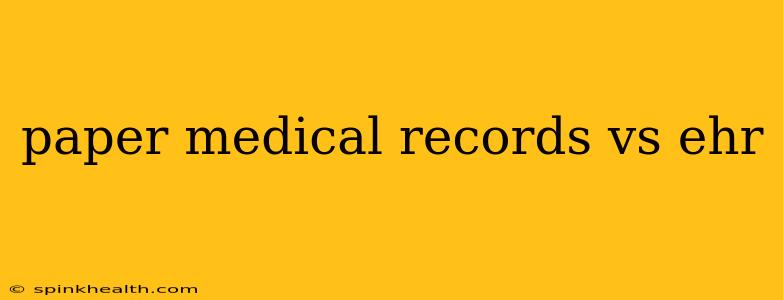Paper Medical Records vs. EHR: A Tale of Two Systems
The hushed rustle of paper, the scent of aging files, the frantic search for a misplaced chart – these were the hallmarks of the traditional medical record system. But the digital age has ushered in a new era, one dominated by the Electronic Health Record (EHR). This shift represents more than just a technological upgrade; it's a fundamental transformation in how healthcare information is managed, accessed, and utilized. Let's delve into the contrasting worlds of paper medical records and EHRs, exploring their strengths and weaknesses.
Imagine yourself as Dr. Eleanor Vance, a seasoned physician accustomed to the familiar weight of paper charts. For years, her office resembled a library, shelves overflowing with patient files. Each patient visit meant pulling the relevant chart, meticulously noting observations, and carefully filing it away. This process, while familiar, was time-consuming and prone to errors. Lost charts, illegible handwriting, and difficulties in sharing information with colleagues were commonplace.
What are the advantages of paper medical records?
This was the reality of paper medical records. While seemingly straightforward, they presented numerous challenges:
- Accessibility: Finding a specific chart could be a time-consuming hunt. Access was limited to the physical location of the records. Sharing information with other healthcare providers involved physical transfer, delays, and the risk of misplacing crucial documents.
- Storage: Storing and managing physical records required significant space, often leading to cramped offices and inefficient use of resources.
- Security and Privacy: Protecting paper records from unauthorized access or damage was a constant concern. Maintaining patient privacy was a delicate balancing act, requiring careful handling and secure storage.
- Data Entry and Analysis: Extracting information for analysis, research, or reporting was tedious and inefficient. The data was essentially locked in the paper format, inaccessible for meaningful insights.
Now, let's fast forward to Dr. Vance's colleague, Dr. Ben Carter, who embraced the EHR system. His office is a picture of modernity, with sleek computer screens displaying patient information at a glance. He can access a patient's complete medical history instantly, view lab results in real-time, and securely share information with other healthcare providers electronically. This efficiency allows him to spend more time with his patients and less time wrestling with paperwork.
What are the advantages of EHR?
The advantages of EHRs are numerous and impactful:
- Accessibility: EHRs offer instant access to patient information from anywhere with an internet connection, improving patient care coordination and reducing delays.
- Improved Accuracy: EHRs minimize errors associated with illegible handwriting and missing information, improving the overall accuracy of medical records.
- Enhanced Security and Privacy: EHR systems typically offer robust security measures to protect patient data from unauthorized access, loss, or theft. Data encryption, access controls, and audit trails enhance privacy and compliance with regulations.
- Better Communication: EHRs facilitate seamless communication among healthcare providers, improving care coordination and reducing medical errors.
- Efficient Data Analysis: EHRs enable easy data extraction and analysis, supporting research, public health initiatives, and performance improvement efforts.
What are the disadvantages of EHR?
However, even the shiny new EHR system has its drawbacks:
- Cost: Implementing and maintaining an EHR system can be expensive, requiring significant upfront investment in hardware, software, and training.
- Learning Curve: Physicians and staff need training to effectively utilize the EHR system, which can be time-consuming and disruptive.
- Technical Issues: System crashes, software glitches, and internet connectivity problems can interrupt workflow and impact patient care.
- Data Security Concerns: While EHRs offer enhanced security features, they are still vulnerable to cyberattacks and data breaches.
- Workflow Disruption: The transition from paper to electronic records can initially disrupt established workflows, leading to temporary inefficiencies.
How much does an EHR system cost?
The cost of an EHR system varies significantly depending on several factors including the size of the practice, the features required, and the vendor chosen. Costs can range from a few thousand dollars for smaller practices to hundreds of thousands or even millions for larger healthcare systems.
Is an EHR system worth the investment?
The decision of whether to invest in an EHR system depends heavily on the specific needs and resources of the healthcare provider. The long-term benefits of improved efficiency, reduced errors, enhanced communication, and better patient care often outweigh the initial investment costs.
What are the privacy concerns of EHR?
Privacy concerns are a significant consideration with EHR systems. While robust security measures are in place, the risk of data breaches and unauthorized access remains. Compliance with regulations like HIPAA is crucial in mitigating these risks.
In conclusion, the journey from paper medical records to EHRs reflects a significant advancement in healthcare technology. While each system possesses its limitations, the EHR's advantages regarding accessibility, accuracy, communication, and data analysis have made it the preferred choice for most modern healthcare settings. However, the cost, security concerns, and the learning curve must be carefully considered before implementing an EHR system. The future of medical records is undeniably digital, but the transition requires careful planning and execution to ensure a smooth and effective shift.

